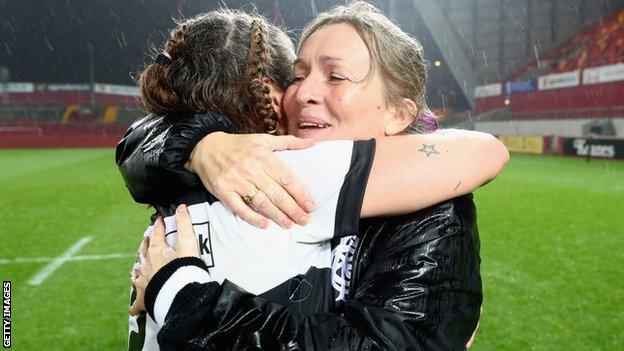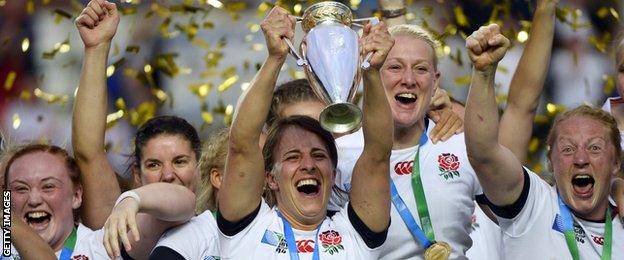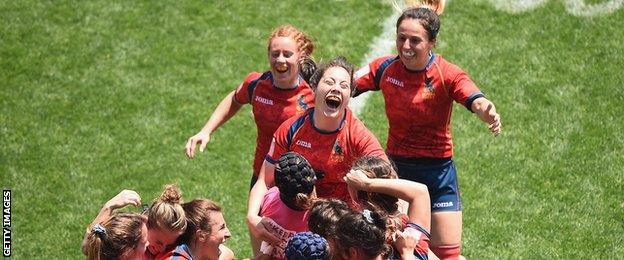Women's rugby must not rush into professionalism - Giselle Mather
- Published

Giselle Mather guided the Barbarians to victory against Munster Women in the Inaugural Representative Match last November
Women's rugby must not rush into professionalism but should take a "slow and sustainable" approach, World Cup winner and elite coach Giselle Mather says.
The Tyrrells Premier 15s league was formed last season, with players operating on an amateur basis.
Mather, Wasps Ladies director of rugby, believes the league will eventually become fully professional, but says it needs to be a "careful and thoughtful" process.
"It is definitely something I would love to see, but we have to get it right," she said.
Mather added to BBC Sport: "If you try and do it quickly it will all go wrong. You can't ask girls to give up their jobs, and then a year later say 'the model is not there'.
"We have lessons that happened just over 20 years ago when the men's game went professional, and some things went horrifically wrong.
"We need to make sure we learn from that and don't make the same mistakes."
RFU must first deliver England contracts

England won the World Cup in 2014 when they beat Canada 21-9 in the final
Mather believes the first step towards professionalising the women's game is for the Rugby Football Union to award full-time contracts to England's elite players.
The RFU has stated its intention to deliver the contracts, but budgetary constraints have delayed the process, with more news expected next month.
Mather says contracting the internationals is the only way to keep pace with the other leading nations, and says she would be "disappointed" if the RFU reneged.
"We are now competing with New Zealand, Australia and France, who have all gone full contracts," she added.
"So yes, the England players need to be contracted and they need to be full-time professionals to compete on the international stage, and we have some amazing athletes, who with that extra bit of support are going to produce a fantastic product for an England side.
"And it's obviously well known that if an international team is doing well, the grassroots absolutely responds to that."
However Mather says the elite end turning professional should only be the first step in the process.
"It has to be looked at how we work that into the Tyrrells Premier 15s, because the England players need to play in that environment so they can have their skills put under pressure," said Mather, who won the World Cup with England in 1994.
"But if you make some players professional, and others not, particularly in our sport with the contact and strength element, if you have a group of athletes who are strength and conditioning every day, and a group of athletes who can't access that, then the product isn't going to work. So that has to be managed really well.
"It is a delicate balance, and maybe the top Tyrrells players have to go semi-professional, and we have to look at ways the contracted players work in the clubs. So it's a huge thing that has to be thought about really carefully.
"The first thing is the contract for the elite players, but not then a five-year gap before we worry about the next [step].
"By going through and planning through each stage as it goes, we will get a very successful model.
"It's evolutionary. Women's sport has exploded, and we are our own brand and it's incredibly exciting. So from that perspective the women's game, generally, is an untapped platform in terms of sponsorship and media interest."
Sevens and XVs specialists

Spain shocked England when they beat them in the quarter-finals of the Women's Rugby Sevens in Japan earlier this year
The RFU currently splits its pool of elite players between the Sevens and XV-a-side games, with players moving between the two on a year-by-year basis; a plan that union chiefs admit "hasn't worked".
RFU director of professional rugby Nigel Melville has told BBC Sport the players will soon become specialists at one form of the game or the other.
The likes of star players Emily Scarratt and Katy McLean represented Team GB at the Rio Olympics in 2016, before returning to the XV-a-side set-up for the World Cup the following year.
"We are now trying to focus on specialist Sevens players who will take that Olympic opportunity, and I think our XVs players will stick with the World Cup and playing professionally with their clubs," Melville said.
"We are in transition at the moment. We are much where the men's game was five or 10 years ago. I think you will get specialists coming through, players who will want to go to the Olympics, and players who will want to play XVs."